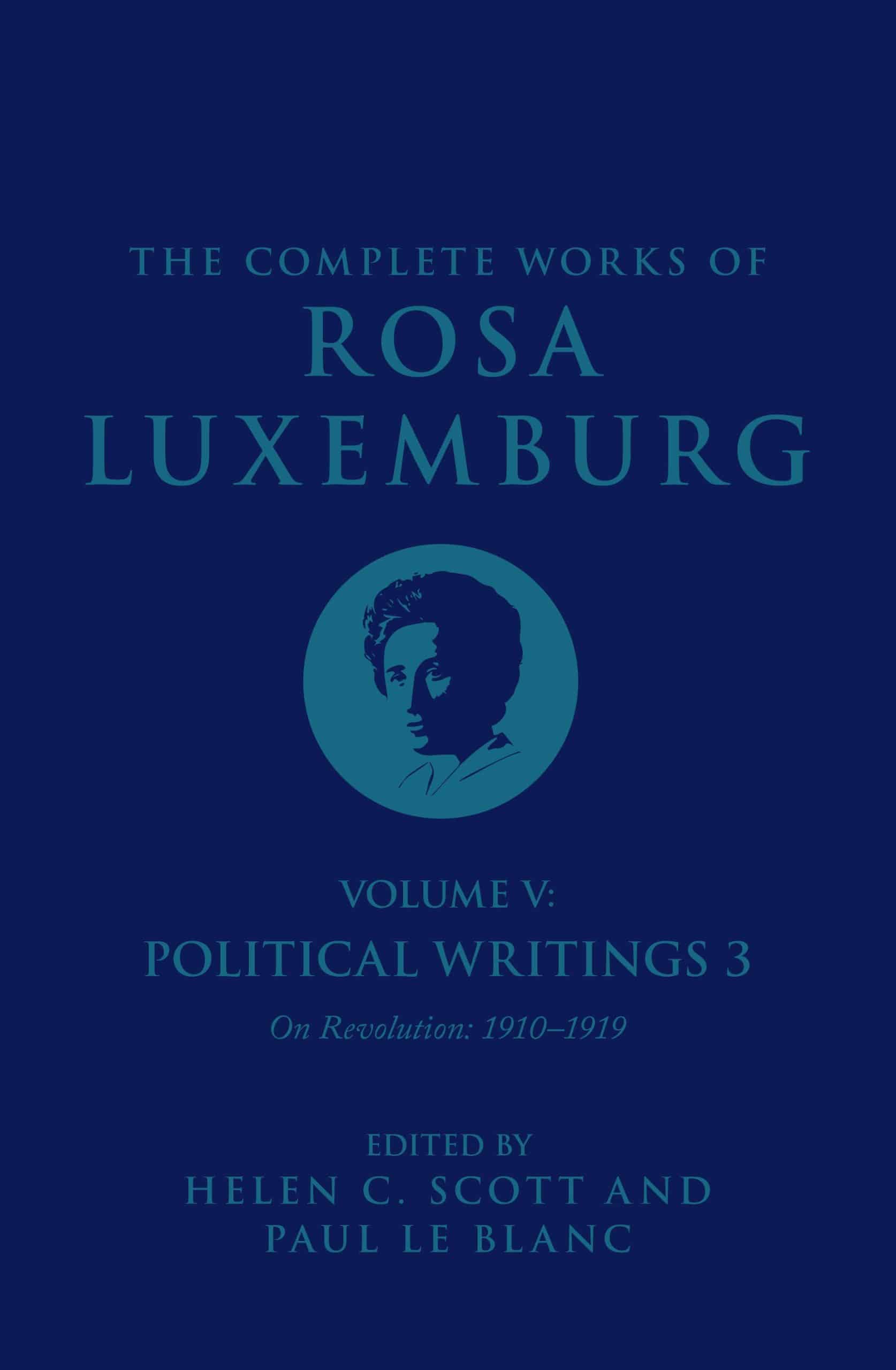The Complete Works Volume of Rosa Luxemburg: Volume V
95.00 JOD
Please allow 2 – 5 weeks for delivery of this item
Description
This volume is the first to contain all of Luxemburg’s eloquent writings on the 1917 Russian Revolution and 1918-19 German RevolutionThis volume is the first to contain all of Luxemburg’s eloquent writings on the 1917 Russian and 1918-19 German Revolutions. It also contains articles, essays and manuscripts on the European socialist movement prior to World War I and her effort to rebuild the socialist movement on revolutionary foundations in its aftermath.Much of this material appears in English for the first time. Her incisive contributions on revolutionary strategy, the German and Russian Revolutions, and the transition to socialism reveal a profound commitment to radical democracy, which becomes evident as she elaborates on her lived experience with razor-sharp conceptualizations of the mass strike.Her democratic commitment is also highlighted in her deepening conflict with the bureaucratic conservatism afflicting the German Social Democratic Party.She is horrified yet at the same time grimly analytical while surveying the unfolding violence and brutality of the First World War.Deeply inspired by Russia’s 1917 upsurge, she is nonetheless compelled to analyze and criticize fatal limitations of the Russian Revolution.Swept up in the revolutionary chaos sweeping through Germany in 1918-1919 which results in her own martyrdom, she gives voice to revolution’s final testament: “I was, I am, I shall be.”
Additional information
| Weight | 0.681 kg |
|---|---|
| Dimensions | 3.7592 × 16.0274 × 23.9268 cm |
| by | |
| Format | Hardback |
| Language | |
| Pages | 512 |
| Publisher | |
| Year Published | 2024-5-28 |
| Imprint | |
| Publication City/Country | USA |
| ISBN 10 | 1784782815 |
| About The Author | Rosa Luxemburg (1871-1919) was a Polish-Jewish revolutionary and one of the greatest theoretical minds of the European socialist movement. An activist in Germany and Poland, she authored numerous classic works in economics and politics, and is widely considered a foremost proponent of radical democracy. She was assassinated in January 1919 and has become a heroine of socialist, feminist, and anti-imperialist movements around the world. |
"A radical of luminous dimension."—Vivian Gornick"Rosa goes on being our source of fresh water in thirsty times."—Eduardo Galeano"Intrepid, incorruptible, passionate and gentle. Imagine as you read between the lines of what she wrote, the expression of her eyes. She loved workers and birds. She danced with a limp. Everything about her fascinates and rings true. One of the immortals."—John Berger"One cannot read the writings of Rosa Luxemburg, even at this distance, without an acute yet mournful awareness of what Perry Anderson once termed 'the history of possibility.'"—Christopher Hitchens, Atlantic"Luxemburg's criticism of Marxism as dogma and her stress on consciousness exerted an influence on the women's liberation movement which emerged in the late '60s and early '70s."—Sheila Rowbotham, Guardian |
|
| Table Of Content | AcknowledgmentsEditorial ForewordIntroduction: Rosa Luxemburg and the Marxist Tradition- by Helen C. Scott and Paul Le BlancAbbreviations1910What Course Now?Party Congress of the SPD of Germany, September 18–24, 1910, in MagdeburgThe Political Mass Strike and the Trade UnionsThe Political Mass Strike and the Unions1911Stolypin’s RegimeThe Reichstag Debates on the Mass Strike1913LódzLódz’s Huge StruggleOn the Political Mass Strike: A Police ReportOn Lódz’s Huge StruggleOn the Political Mass Strike [August 1913]On the Political Mass Strike [August 12, 1913]Lódz’s Huge StruggleJena Party CongressOn the Political Mass Strike [September 19–20, 1913]Mass Strike and the Taxation Question1914Can the Mass Strike be Considered a Means of Defense for the Proletariat in a Changed Political Constellation?On the Prussian Suffrage StruggleOnce Again the Prussian Suffrage StruggleThe Establishment of a Mass Strike Fund1915What’s with Liebknecht?1916Liebknecht1917The Russian RevolutionThe Revolution in RussiaRussian ProblemsThe Old MoleTwo Easter MessagesBurning Issues of Our Time1918–19Historical ResponsibilityFragment Concerning War, the National Question and RevolutionNot Following the ScriptToward the CatastropheHandwritten Fragments on the History of the International, German Social Democracy, War, Revolution, and Post-War PerspectivesOn the Russian RevolutionThe Russian TragedyThe Little LafayettesThe BeginningThe Old GameThe National AssemblyA Daring GameTo the Proletarians of All CountriesThe Acheron in MotionParty Congress of the Independent Socialist PartyThe “Immature” MassThe Socialization of SocietyFourteen Dead—One Woman MurderedOn the Executive CouncilWhat Does the Spartacus League Want?To the BarricadesExtraordinary General Assembly of the German Independent Social Democratic Party of Greater Berlin—On December 15, 1918National Assembly or Council Government?Ebert’s MamelukesA Pyrrhic VictoryThe Election of the National AssemblyThe Reich Conference of the Spartacus LeagueFounding Congress of the Communist Party of GermanyThe First Party CongressWhat Are Our Leaders Doing?Neglected ObligationsThe Leaders’ FailureHouses of CardsOrder Prevails in BerlinAppendix: Once Again, On Organization and DisorganizationA Glossary of Personal NamesIndex |
| Excerpt From Book | AcknowledgmentsEditorial ForewordIntroduction: Rosa Luxemburg and the Marxist Tradition- by Helen C. Scott and Paul Le BlancAbbreviations1910What Course Now?Party Congress of the SPD of Germany, September 18–24, 1910, in MagdeburgThe Political Mass Strike and the Trade UnionsThe Political Mass Strike and the Unions1911Stolypin’s RegimeThe Reichstag Debates on the Mass Strike1913LódzLódz’s Huge StruggleOn the Political Mass Strike: A Police ReportOn Lódz’s Huge StruggleOn the Political Mass Strike [August 1913]On the Political Mass Strike [August 12, 1913]Lódz’s Huge StruggleJena Party CongressOn the Political Mass Strike [September 19–20, 1913]Mass Strike and the Taxation Question1914Can the Mass Strike be Considered a Means of Defense for the Proletariat in a Changed Political Constellation?On the Prussian Suffrage StruggleOnce Again the Prussian Suffrage StruggleThe Establishment of a Mass Strike Fund1915What’s with Liebknecht?1916Liebknecht1917The Russian RevolutionThe Revolution in RussiaRussian ProblemsThe Old MoleTwo Easter MessagesBurning Issues of Our Time1918–19Historical ResponsibilityFragment Concerning War, the National Question and RevolutionNot Following the ScriptToward the CatastropheHandwritten Fragments on the History of the International, German Social Democracy, War, Revolution, and Post-War PerspectivesOn the Russian RevolutionThe Russian TragedyThe Little LafayettesThe BeginningThe Old GameThe National AssemblyA Daring GameTo the Proletarians of All CountriesThe Acheron in MotionParty Congress of the Independent Socialist PartyThe “Immature” MassThe Socialization of SocietyFourteen Dead—One Woman MurderedOn the Executive CouncilWhat Does the Spartacus League Want?To the BarricadesExtraordinary General Assembly of the German Independent Social Democratic Party of Greater Berlin—On December 15, 1918National Assembly or Council Government?Ebert’s MamelukesA Pyrrhic VictoryThe Election of the National AssemblyThe Reich Conference of the Spartacus LeagueFounding Congress of the Communist Party of GermanyThe First Party CongressWhat Are Our Leaders Doing?Neglected ObligationsThe Leaders’ FailureHouses of CardsOrder Prevails in BerlinAppendix: Once Again, On Organization and DisorganizationA Glossary of Personal NamesIndex |
Only logged in customers who have purchased this product may leave a review.






Reviews
There are no reviews yet.